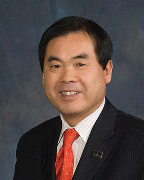I am not insane.
People will probably accuse me of being insane because I’m starting my 2012 blog by talking about failures. I can imagine some readers’ reaction. “Don’t you have better things to write about?”
But the point I want to make is that it isn’t the end of the world when you fail. What matters is the new set of wheels you create after you get up and go on with your journey. Awareness is key. I admire our political leaders for realizing exactly what cost them the election. They are not ashamed to share their lessons.
Your goal for year 2012 is to know how to use your negatives and turn them into positives.
Never give up. Believe in yourself, and you will succeed.
“Why did you lose your mayoral bid?” I asked Federal Way City Councilmember Michael Park when I saw him recently in Seattle.
Park ran for mayor (a full-time paid position) in 2010 and finished fourth in the race, despite the fact that he raised the most campaign money and ran successfully for city council three times, unopposed.
Park is known as the first Asian American mayor in Washington state. He was appointed to fill in a vacant seat, then voted by the city council as deputy mayor in the 1990s, and then as mayor in 2006 and 2000 when it was more of a ceremonial job.Ironically, those factors did not help Park get elected as mayor in 2010.
They became the reasons for his defeat, he said.When you are unopposed for so long, he said, it doesn’t generate publicity and buzz among your constituents. “You stop campaigning,” he said.
Naturally, he stopped raising money and organizing. Unopposed incumbents tend to pick up fewer supporters and are less aggressive in the fighting ring.Stagnation was the reason Park was not prepared for a tough race. Re-learning the process was slow and hard. He didn’t know how to stand out among his challengers.”I didn’t have a strategy,” said Park, looking back at his campaign, one in which his opponents used every opportunity to attack him. Some even sent racist letters to newspapers stating that he sold out the city to Korean developers.
Park immigrated from South Korea in 1976.I thought it would be hard for Park to discuss his failure.
It was the first question I asked him. But he was comfortable, open, and honest.After 16 years as a Federal Way councilmember, he announced his retirement with pride, effective December 2011.
Mayor Skip Priest honored him with a retirement party in December and more than 200 people attended.Park’s retirement could be welcoming news for his wife, who took care of the family’s dry cleaning business when Park was busy with the council.Thank you, Mayor Park, for your long service and being a role model for our community.Rep. Cindy Ryu proves that ‘losers’ can be winners.
Why Federal Way’s Michael Park lost

Michael Park
Should a politician get a prize after she loses her election? For Rep. Cindy Ryu, who lost re-election as Shoreline Mayor in 2009 by 183 votes, the prize was wonderful. A glamorous makeover and a cruise.
I have never seen anyone bounce back so quickly. Some politicians feel so ashamed that they hide. Others become depressed and drop out of public life.
But Ryu’s mourning period was short. Immediately, she surfaced in the public with a smiling face and a new hairdo. She looked young and refreshed. There was not a hint of self-pity or bitterness, although she “hated losing.” No one could tell this person had just suffered defeat. In hindsight, Ryu said, “Many friends and supporters thought I would win easily, so (they) did not turn out to help as hard as they had done in 2005.” Those assumptions led to her defeat, she said.
Ryu knew she had work to do, exploring her options and reconnecting with her supporters.
“You either have a victory party or a consolation prize,” she said philosophically. (And actually, this was her second loss. Her first loss was in her first run for Shoreline City Council in 2003; she lost by 800 votes to an incumbent.) Four months later, she announced she was running for state representative from the Shoreline district. And she won, easily, beating two other opponents.
Way to go, girl!
How to be a successful Asian American candidate
I am not a politician. I have interviewed many, though. Successful Asian American candidates need to be involved in both the mainstream and Asian communities. It is not enough to be strong in your own community. You can’t win that way. You have to make a name in both. So start early to cultivate your support base, including your neighborhood. Do you really know your neighbors? I am afraid not.
In fact, I recalled one candidate had hostile neighbors. One of his neighbor even filed a lawsuit against him. This tells your constituents that if you don’t know how to treat your neighbors, you probably can’t deal well with bigger issues and bigger neighborhoods.
If you lost, don’t feel ashamed, Your community will always be proud of you. You and the community have learned to be more sophisticated campaigners. (end)

